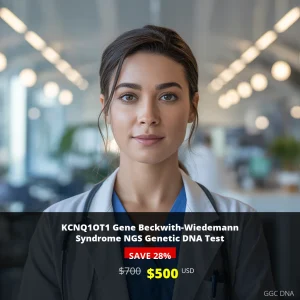Epidermal Growth Factor Receptor Mutation Analysis (EGFR Exon 18, 19, 20, 21)
Understanding EGFR Mutation Analysis
Epidermal Growth Factor Receptor (EGFR) Mutation Analysis represents a groundbreaking advancement in personalized cancer medicine. This sophisticated genetic test specifically examines mutations within exons 18, 19, 20, and 21 of the EGFR gene, which play a critical role in determining treatment responsiveness for non-small cell lung cancer (NSCLC) patients. The EGFR protein functions as a key regulator of cell growth and division, and specific mutations can lead to uncontrolled cancer cell proliferation.
What This Test Measures and Detects
Our comprehensive EGFR Mutation Analysis utilizes advanced Sanger Sequencing technology to identify specific genetic alterations in the EGFR gene:
- Exon 19 Deletions: The most common EGFR mutations associated with excellent response to EGFR tyrosine kinase inhibitors
- Exon 21 L858R Point Mutations: Another frequent mutation with strong sensitivity to targeted therapies
- Exon 18 Mutations: Including G719X mutations that may respond to specific EGFR inhibitors
- Exon 20 Insertions: Mutations often associated with resistance to first-generation EGFR inhibitors
- T790M Resistance Mutations: Secondary mutations that can develop during treatment
Who Should Consider EGFR Mutation Testing
This test is particularly important for individuals with:
- Newly diagnosed non-small cell lung cancer, especially adenocarcinoma
- Advanced or metastatic lung cancer requiring treatment planning
- Previous negative EGFR testing with ongoing clinical suspicion
- Progressive disease during current cancer treatment
- Family history of lung cancer or genetic predisposition
- Never-smokers or light smokers with lung cancer diagnosis
- Asian ethnicity, which has higher prevalence of EGFR mutations
Clinical Symptoms and Indications
Patients experiencing persistent cough, chest pain, shortness of breath, unexplained weight loss, or other lung cancer symptoms should discuss EGFR testing with their healthcare provider. Early genetic profiling can significantly impact treatment outcomes and quality of life.
Benefits of EGFR Mutation Analysis
- Personalized Treatment Selection: Identifies patients most likely to benefit from targeted EGFR inhibitors
- Avoid Unnecessary Chemotherapy: Helps prevent exposure to ineffective treatments and their associated side effects
- Improved Survival Outcomes: Targeted therapy based on mutation status can significantly prolong progression-free survival
- Treatment Cost Efficiency: Ensures healthcare resources are directed toward the most effective therapies
- Comprehensive Genetic Profiling: Provides essential information for clinical trial eligibility and future treatment options
- Fast Turnaround Time: Results typically available within 3-4 days for timely treatment decisions
Understanding Your Test Results
Your EGFR Mutation Analysis results will fall into one of several categories:
Positive for Sensitizing Mutations
If your test detects mutations in exons 19 or 21 (such as deletions in exon 19 or L858R in exon 21), you are likely to respond well to EGFR tyrosine kinase inhibitors like gefitinib, erlotinib, or afatinib. Your oncologist will discuss appropriate targeted therapy options.
Presence of Resistance Mutations
Detection of T790M mutations or exon 20 insertions may indicate resistance to first-line EGFR inhibitors. In these cases, your healthcare team may recommend third-generation EGFR inhibitors or alternative treatment strategies.
Negative Results
A negative result means no common EGFR mutations were detected. This information helps guide treatment toward other targeted therapies, immunotherapy, or conventional chemotherapy based on your specific cancer characteristics.
Rare or Uncommon Mutations
Some mutations may have variable responses to treatment. Your genetic counselor and oncology team will provide personalized interpretation and recommendations based on the specific mutation identified.
Test Pricing and Information
| Test Component | Price (USD) |
|---|---|
| Discount Price | $262 |
| Regular Price | $350 |
| Turnaround Time | 3-4 Days |
| Sample Type | Tumor Tissue (Paraffin Embedded Blocks) |
| Testing Method | Sanger Sequencing |
Pre-Test Requirements
This test requires a doctor’s prescription for most clinical scenarios. However, prescription requirements do not apply to surgical cases, pregnancy-related testing, or individuals planning international travel. Our genetic counseling team is available to discuss any questions about testing eligibility and requirements.
Nationwide Testing Availability
GGC DNA provides comprehensive EGFR Mutation Analysis services across the United States, with convenient testing locations in all major metropolitan areas including:
- New York City and surrounding regions
- Los Angeles and Southern California
- Chicago and the Midwest
- Houston, Dallas, and Texas locations
- Miami and Florida centers
- Philadelphia and Northeast locations
- San Francisco Bay Area
- Washington D.C. and Baltimore
Take Control of Your Cancer Treatment Journey
EGFR Mutation Analysis represents a critical step toward personalized cancer care. By understanding your tumor’s genetic profile, you and your healthcare team can make informed decisions about the most effective treatment strategies. Our experienced genetic counselors and oncology specialists are dedicated to providing comprehensive support throughout your testing journey.
Ready to schedule your EGFR Mutation Analysis? Contact our dedicated patient care team today to discuss your testing needs, insurance coverage, and appointment availability. Call us at +1(267) 388-9828 or use our online booking system to secure your testing appointment.
Don’t leave your treatment decisions to chance. Empower yourself with precise genetic information that can transform your cancer care experience. Book your EGFR Mutation Analysis test with GGC DNA today and take the first step toward personalized, targeted cancer therapy.







